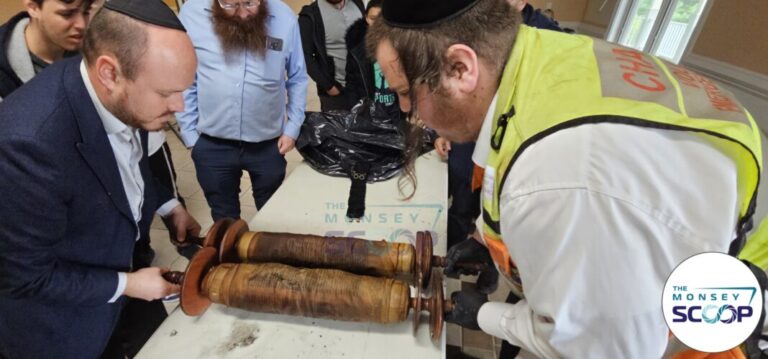 By Rabbi Yair Hoffman for the Five Towns Jewish Times
By Rabbi Yair Hoffman for the Five Towns Jewish Times
This past Shabbos, many girls were named at the reading of the Torah. One of the most common names that is given to baby girls of late is “Shira.” The name, however, is not without controversy.
Once, Jewish names used to be relatively easy to identify. Moshe and Dovid, these were Jewish names. Chris, Winston, Thaddeus, and Peter – these were not Jewish names. True, there was one of the Baalei HaTosfos whose name was Rabbeinu Pehter, but by and large this was an aberration.
Having a Jewish name is important. Chazal tell us (BaMidbar Rabba 20:22) that the reasons the Jewish people were redeemed from Egypt was because they did not change their names, their language, and their mode of dress. Indeed, the Maharam Shick (YD responsa 169) and the Darchei Teshuvah (YD 178:14) understand that the prohibition of naming a child a non-Jewish name is a biblical one stemming from the prohibition of UbeChukosaihem lo sailachu.
[As a parenthetic note, it is said of the Maharam Schick that when the temporal authorities decreed that every family must take on a last name, he specifically chose Schick – which is an acronym for Shaim Yisroel Kodesh. ]
Clearly, having a Jewish name is important.
CAREFUL CONSIDERATION
The Sefer Chassidim (244) writes of the tremendous importance for the parents to think carefully as to what to name their child. The name itself can not only cause or remove psychological barriers, it can also become a factor in the spiritual growth of the child too. The Midrash Tanchuma in Parshas HaAzinu explains that a person should look to give a name that would help the child become a Tzaddik – because at times the name can be influential in this. The Gemorah in Brachos 7b cites Rabbi Elazar that there is a verse to this effect that Shma Garim – names do matter.
So what has happened of late?
There are a number of Torah observant Jews that, when visiting Eretz Yisroel, try to get an audience with the Gedolei Torah of Klal Yisroel. Rav Chaim Kanievsky shlita is recognized as one of the Gedolei HaDor and receives visitors on a regular basis. When people ask for a bracha for a Shidduch, however, they are sometimes in for a shock. Rav Kanievsky is of the opinion that the names “Shira” and [perhaps] “Rina” are actually not Jewish names at all. He advises that they should be changed immediately. Thus Rinas become Raizels or Rachels and Shiras become Saras or Shifras. And we are witnessing these changes by the dozens. The word “Shira” means joyous song and the word Rina also means a musical joy. [There are conflicting reports about whether Rav Kanievsky advised that Rina should be changed or not].
But is this idea universally held?
RAV MOSHE FEINSTEIN’S VIEW
Rav Moshe Feinstein zt”l in Igros Moshe (OC IV #66) clearly learns that names can become Jewish names by virtue of their use among Jews. He cites as an example the name of Maimon, father of the Rambam as well as Vidal the author of the Maggid Mishna. Originally, these were decidedly not Jewish names. He discusses it further in Orech Chaim Vol. V 9:10. In these responsa he explains that the initial people who named their children with non-Jewish names were in violation of this idea. However, gradually when more Jews began doing it, the names attained a Jewish flavor. The Gedolei Torah that this author has consulted with are of the opinion that Rav Moshe would have ruled that Shira is now indeed a Jewish name.
POSSIBILITY OF IT BEING A NON-NAME
Perhaps one could counter to these Poskim that Rav Kanievsky’s view is that the problems with the names Shira and Rina are not that they are not Jewish names, but that they are not names at all. In order to address this possibility it may be worthwhile to examine some of the names found in the Mishna and Gemorah. We find in Pirkei Avos that Ben Hay Hay tells us “Lefum Tzaara Agra – according to the level of difficulty involved in observing a Mitzvah is the reward.” Most people focus on his message, but let’s take a moment to focus on the Rabbi’s name. What kind of name is Ben Hay Hay? The Torah Lishma (Responsa #402) cites this very notion as a proof that one may even name someone after a Hebrew letter. If this is the case, then it would seem plausible that one can also name after a full Hebrew word as well – not just a Hebrew letter. This is especially true when we have so many people doing it – there are thousands of Shiras and Rinas. There are also quite a few Gilas and Ditzas too, but it is not known whether Rav Chaim has expressed an animadversion to these names.
There is a Tosfos in Chagigah 9b that states that Ben Hay Hay was actually a Ger Tzedek and that this name was given to him because it alludes to the fact that he is a descendant of Abraham and Sarah. Both Abraham and Sara received the extra letter Hay from Hashem. But this does not negate the idea that one may name after non-names. The Tosfos merely provide a reason why it was done, but no one is questioning whether it may be done or not.
KIVUD AV V’AIM
There may be another issue here as well. Often, when a child is named – it is because the father and mother both agreed upon that particular name. To opt not to use the name which the parents had originated and decided upon may border upon issues of Kivud Av v’Aim – especially when there are halachic authorities that would have clearly permitted it. There are also a number of Seforim that state that the name given a child by the parents constitutes the will and expression fo Shamayim (See Sefer HaGilgulim chapter 59).
It is this author’s understanding that most of the time, it is not the parents or the child who first pose the question. If, however, one had actually asked the question to Rav Chaim Kanievsky Shlita, then the principle of following the ruling of a Rav when one had posed the question comes into play. Generally speaking, if someone poses a question to one Rav, he should not ask a different Rav for a ruling. In such circumstances, one should weigh all the elements together in consultation with one’s Rav or Posaik.
SHIDDUCHIM CHANGES
On the other hand, there have been many situations where young women who have not successfully found their bashert have gone to Rav Chaim Kanievsky and were told that they should change their name to Sara and within a very short time span they have found their bashert. One should not discount such stories and this author is aware of more than one such case. Regardless, we see the power of listening to our Gedolei Torah.
The author can be reached at [email protected]
The seventh volume of Not Your Usual Halacha has just been released. The author’s books can be purchased at amazon.com






20 Responses
About the last comment of being helped after listening to Rav Chaim shlita. It is my humble opinion that it is not the changing the name that brought about the yeshua. there are many a “Shira”that is married. It’s the merit of heeding his words, whatever they may be, that brings about the salvation.
Hard to imagine that Raizel is more of a Jewish name than Rina.
Well presented, as usual!
The use of non-Jewish names isn’t all that rare. There are many examples in Shas. Hyrcanus,Yannai, Alexander, Antignos, Poppa, Tarfon, etc.
Rav Moshe says that it is mistaber that the Midrash that says that the keeping of names was one of the zechusim in Mitzrayim is davka before matan Torah. In Mitzrayim these things kept Bnei Yisroel separate but now that we have the Torah to keep us separate there is no issue with giving non-Jewish names.
What was your reason for using the word “animadversion”? Perhaps the more perspicacious choice would be to write an article that all people can envisage.
Dovid isnt a Jewish name. Its David
If the names Shira and Rina are not considered names because it means joy, why is the name Simcha accepted?
The name Shprinsa comes from the Spanish Esperanza
The name Yentl comes from the French Gentille
why not add it that many ppl use their English namrs n never their hebrew names which loses the bracha n mazel associated with
Why is Shprintze, Zlatte, Kreindel and Golde more of a Jewish name than Shira and Rina?
A well written article. I’d like to preface my comments with saying that we must be very careful when dealing with the Psak of a Gadol the stature of Rav Chaim, though we may disagree. I have a close family member who was told to change her name from Shira by Rav Chaim. I find it very strange however. No name was a name until it was a name. Not even Chaim. The article does not explain is why he so vocal about the name Shira? Is Mendel a Jewish name? Kalman, Isaac, Tova, yenta? The name Treina comes from Katrina, and was the name of the Goan’s mother. There seems to be something missing here.
My wife name was changed by R’Chaim from Ilana to Leah when she was looking for a shiduch.
Raizel is a Yiddish name, not Hebrew.
Yiddish is a Germanic-Slavic dialect with some Hebrew thrown in.
Changing a name from Rina to Raizel appears to be changing it from Hebrew to a Germanic-Slavic dialect.
I would assume the Hebrew would be preferred.
We know Rav Chaim has said what he is quoted as saying regarding Shira (I personally know of one person who heard it directly from him). So why all the pilpul (without the chaveirim)? Ask Rav Chaim all these questions.
#9 Not that they are not Jewish names, but that they are not names at all, according to Rav Chaim.
He probably wouldn’t agree with name like Chenli, Ganit, Guy, Ron and other Israeli made-up names.
Maase Shehaya: American father came to Rav Chaim and asked for a Brocha for his daughter Shira. Rav Chaim said change her name to Sarah. He did not know what to do so he went to Aharon Leib Shteinman.This was the conversation: “Rav Chaim told me to change my daughter, Shira’s name”. “But why, Shira is such a pretty name?” “He told me to change it to Sarah” “Davka the Yud which is Sheim hashem you should take out??”
Rav Chaim’s shita of not using modern names is well known. Not everyone agrees with his shita.
If Shira is not a Jewish name, then what culture or nationality other than Jews use it?
Even if one uses a traditional name (Sarah, Rachel, Chana etc.), it never gets used anyway. Just look at the YWN Simcha Listing on the right margin of this page and you will only see Surele, Ruchele, Chane, etc. So just name your daughter Shirale and Rav Chaim’s concerns will have been addressed.
First off um not sure why there is any debating going on here…we have a gadol that one can ask so why speculate and write an article without being able to answer what he means definitively.
Second what uve heard is not that the names arent names but that the name for example shira has no torah backround and therefore if one wants bracha it should be from a name that has meaning in the torah as a name……again just what i heard…but instead of speculating someone should be calling and finding out for sure.
Rambam’s wife was named “Jamila.”
Sooo many Ashkenazi woman with Germanic or Slavic names & no accompanying Hebrew name.
What, Sterneh, Mariasha and Badonna are names but Wilma, Jennifer and Shira are not?
“Milka” is a name; we know this. But “Malka”? How is that a name?
I’m certain that Rav Kanievsky’s words have bee
…have been misunderstood and misportrayed in this article.